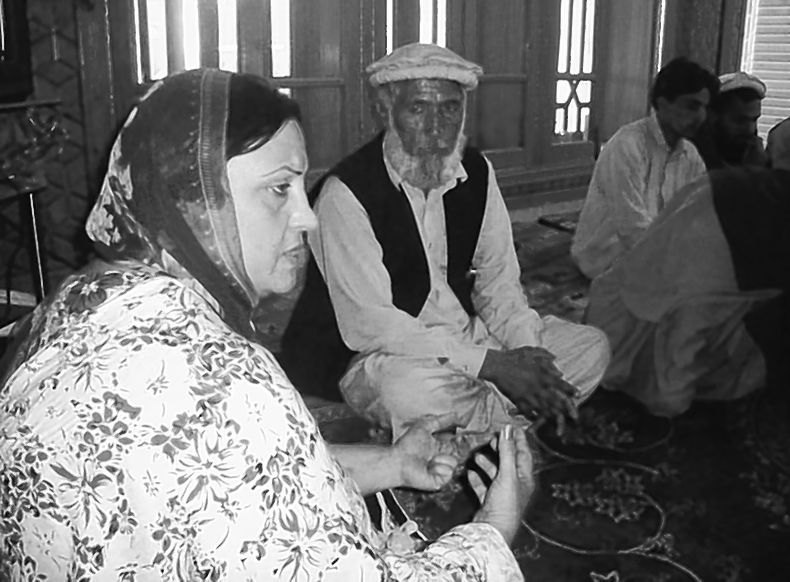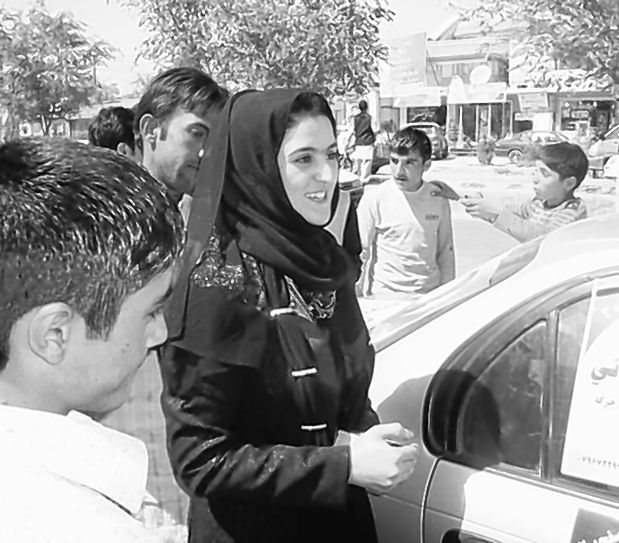JALALABAD, Afghanistan – When Hawa Alam Nuristani ran for a seat in the Afghan parliament five years ago, gunmen ambushed her on a campaign visit to remote mountain villages and she survived a five-hour rescue on donkeys and her supporters’ shoulders with blood oozing from a leg wound.
Last year, she escaped with minor injuries from a car bomb that exploded outside NATO’s Kabul headquarters seconds after she had dropped off her eldest daughter, Rana, who worked for the U.S.-led force’s radio service. Rana was among the 91 people who were wounded; seven died.
Yet not only is Hawa Nuristani seeking re-election from Nuristan province in parliamentary elections today, but Rana Nuristani also has followed her mother into the cutthroat arena of Afghan politics, running for one of 33 seats in Kabul province. If they prevail, the pair will make Afghan history as the first mother and daughter to enter the lower house of parliament together.
Many Afghans, however, fear that a repeat of the massive official vote-rigging and insurgent attacks that stained last year’s presidential poll will mar today’s voting. Campaigning officially ended at midnight Thursday.
Mayhem reportedly flared Friday across Afghanistan. It included the death of a NATO soldier, insurgent attacks in two provincial capitals and the abductions of one candidate and 18 campaign staffers and election workers.
“Yes, I’m very concerned about Rana,” said Hawa Nuristani, whose husband, a former army general with whom she had four daughters and a son, died two years ago. “This was her decision. When she told me that she was running for parliament, I didn’t oppose it.”
Hawa Nuristani decided not to risk campaigning this time in insurgency-racked Nuristan, one of the poorest, most rugged and least developed of Afghanistan’s 34 provinces. Instead, she’s relying on the efforts of surrogates who traveled to meet her in her home in the eastern city of Jalalabad, in Nangarhar province.
“It’s impossible to go to Nuristan. If you campaign, you have to take off your burqa to speak,” she said, referring to the body-covering shroud that Afghan women wear. “On the way back, it would be very risky because of the threat of bomb or rocket attack.”
Rana Nuristani has had it easier in the relative safety of Kabul, distributing fliers and greeting people in downtown markets and on street corners, drawing gaggles of admiring young men in her wake. It was too dangerous to visit outlying areas, though — she canceled stops in two of them this week — and she’s received numerous threatening telephone calls.
“They say, ‘You are not a real Muslim girl. Your posters are all over the place. What gave you the right to do that?’ ” she recounted in the borrowed office that serves as her headquarters. She was referring to a belief among conservative Afghans that a woman should never show her unveiled face in public.
“God gave voting rights to females as well as males. If men can do something, why can’t women? We have the same knowledge. We have the same ability,” she recalled telling one threatening caller. “After a long discussion, he said he was so sorry, and he agreed to work for me.”
Neither woman has retained bodyguards, in the belief that doing so would raise their profiles.
The pair spoke in the same ebullient manner in separate interviews, Hawa Nuristani in her native Pashtu, Rana Nuristani in the proficient English she learned during two years as a high school exchange student in Hayward, Calif.
“Women usually are more sympathetic and can serve the youth and society better,” said Mohammad Omar, 29, a volunteer for Rana Nuristani. “It shouldn’t matter that I support a woman. She wants to serve the country.”
Running in the war-ravaged nation’s second parliamentary elections since the 2001 U.S.-led invasion has been especially dangerous for female candidates.
Afghanistan’s traditional male-dominated culture prohibits women from leaving their walled homes to shop – let alone work or run for public office – unless they’re accompanied by close male relatives and wearing burqas.
It’s also been harder for women to raise campaign money. Local powerbrokers want resources directed to men and have pressured female candidates’ families to deny them money and other aid, said Raissa Tatad-Hazell of the U.S.-based National Democratic Institute, a nonprofit group that works to support democratic practices and institutions.
Still, she said, it’s a sign of progress that there are 78 more female candidates this year than there were in 2005, when 328 women competed.
“There is an increased level of commitment and enthusiasm,” Tatad-Hazell said. “For women to come out in such numbers, they must know what the office stands for.”
The Nuristanis defy the diminished status that traditional Afghan culture accords women.
Hawa Nuristani has an undergraduate journalism degree and worked as a state-run television announcer. She’s pursuing a political science degree in her spare time. The liberty she allows her daughters has caused friction within the family.
Rana Nuristani, 25, who’s seeking a law degree, has hosted television shows and worked for the NATO force’s radio service and for the International Committee of the Red Cross. Her sisters, Arzo, 17, a journalism major at Kabul University, and Mursal, 19, a management student, co-host a state-run television children’s show. One speaks in Pashtu, the other in Dari. The youngest girl, Rahil Bahar, is 7, and brother Abdullah is 14.
“I decided to nominate myself so I could raise the voice of the youth in parliament,” Rana Nuristani said. “A young person can better understand the problems of young people.”
“We are different in every respect,” said Hawa Nuristani, her bright eyes dimming slightly. “Sometimes I think that this country is not made for us. Why should I waste my daughters’ youth in this country?”
Yet, she continued, she’s dedicated to working to improve the lives of the 400,000 people, especially women, in Nuristan.
Send questions/comments to the editors.




Success. Please wait for the page to reload. If the page does not reload within 5 seconds, please refresh the page.
Enter your email and password to access comments.
Hi, to comment on stories you must . This profile is in addition to your subscription and website login.
Already have a commenting profile? .
Invalid username/password.
Please check your email to confirm and complete your registration.
Only subscribers are eligible to post comments. Please subscribe or login first for digital access. Here’s why.
Use the form below to reset your password. When you've submitted your account email, we will send an email with a reset code.